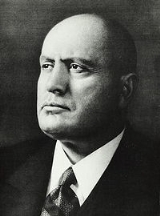
authoritarian
nationalist
political ideology
. Fascists seek to rejuvenate their nation
based on commitment to the national community as an organic entity, in which individuals are bound together in national identity
by suprapersonal connections of ancestry, culture
, and blood
. To achieve this, fascists purge forces, ideas, people, and systems deemed to be the cause of decadence
and degeneration
. Fascists advocate the creation of a totalitarian
single-party state
that seeks the mass mobilization of a nation through indoctrination
, physical education
, discipline
and family policy (such as eugenics
).
The Fascist accepts life and loves it, knowing nothing of and despising suicide; he rather conceives of life as duty and struggle and conquest, life which should be high and full, lived for oneself, but not above all for others -- those who are at hand and those who are far distant, contemporaries, and those who will come after.![]()
The struggle between the two worlds [Fascism and Democracy] can permit no compromises. The new cycle which begins with the ninth year of the Fascist regime places the alternative in even greater relief- either we or they, either their ideas or ours, either our State or theirs!![]()
If relativism|relativism signifies contempt for fixed categories and those who claim to be the bearers of objective immortal truth, then there is nothing more relativistic than Fascist attitudes and activity. From the fact that all ideologies are of equal value, we Fascists conclude that we have the right to create our own ideology and to enforce it with all the energy of which we are capable.![]()
What a man! I have lost my heart!... Fascism has rendered a service to the entire world... If I were Italian, I am sure I would have been with you entirely from the beginning of your victorious struggle against the bestial appetites and passion of Leninism.![]()
Spend most of the day reading fascisti leaflets. They certainly have turned the whole country into an army. From cradle to grave one is cast in the mould of fascismo and there can be no escape...It is certainly a socialist experiment in that it destroys individuality. It destroys liberty. ![]()
Marxism has led to Fascism and National-Socialism, because, in all essentials, it is Fascism and National Socialism.![]()
The movement in Germany is analogous mostly to the Italian. It is a mass movement, with its leaders employing a great deal of socialist demagogy. This is necessary for the creation of the mass movement. The genuine basis (for fascism) is the petty bourgeoisie. In Italy, it has a very large base—the petty bourgeoisie of the towns and cities, and the peasantry. In Germany, likewise, there is a large base for fascism.![]()

